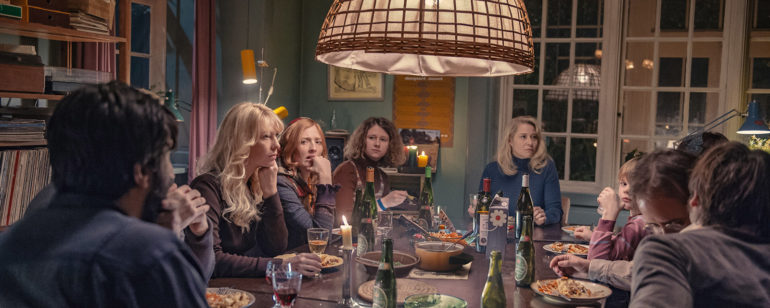The Commune is the latest effort from Danish director Thomas Vinterberg, who along with fellow Danish visionary Lars von Trier was co-founder of the Dogme 95 film movement. This film more or less finds itself contained within the rules of said manifesto, and is as real and as hard hitting as much of his previous work.
The Commune follows the story of an ambitious couple named Erik (Ulrich Thomsen) and Anna (Trine Dyrholm) and their daughter Freja (Martha Hansen) as they visit the house of Erik’s estranged father who has recently passed away. Erik, an architect, deems the grand house unnecessary for the small family. Anna, tired of the routine of their marriage and fearing her life may be coming to a standstill, convinces Erik that they should invite people to live in the house with them for both practical and emotional reasons.
The Commune really is a tale of two halves. The first half of the film focuses on Erik coming to terms with the new living situation, being very reluctant at first. The people of the commune are exactly what one would expect. Easy-going, free-thinking, bohemian types; invaders in the rigid, structured world which Erik has tried to carve for himself. As the commune begins to cement itself within the house he becomes estranged from his wife, feeling as if he is losing her; not to another man, but to an entire group of different people. That is until he meets architecture student Emma (Helene Neumann) and embarks on a liaisons dangereuses of his own.
Emma and Erik quickly become an item and in an adult manner she is invited to join the commune. The fun and games throughout the first half of the film quickly turn to emotional turmoil, especially in regards to Anna who is (obviously) less than favourable of her new housemate. Much has been made of Thomsen’s performace as Erik but it is Dyrholme’s double-edged performance as the orchestrator of the experiment to depressive wreck that truly carries the film. Her concerns with her own sexuality, her marriage and her age are laid bare, always fragile and always on the verge of spiralling out of control.
The film accelerates at lightning fast pace which, unlike some members of the commune, never outstays its welcome. There are a number of twists and turns which, more often than not, can be quite puzzling or emotionally draining, but any chance of the film becoming an out-and-out depressing spectacle is dashed by the sprinkling of effectively dry humour here and there.
Like much of the Dogme 95 catalogue, there is no excess. The entire film is sparse and minimal, yet has a great sense of warmth. The minimal colour is used to great effect, and the whole experience has a dark beauty underlying it, even in its more light-hearted scenes.
Neither hilarious or humourless, happy nor sad,The Commune is one of those films that just has to be experienced. It is a coming-of-age tale for the young and the old. It is an exploration of human relationships, love and sexuality. A compact family drama which offers more questions than answers, the viewer just has to disregard anything outside of the cinema and join the commune for as long as it turbulent existence allows.
https://www.youtube.com/watch?v=6hRpqriyfI8

